Water Sector Trust Fund Wins 2019 United Nations Public Service Award
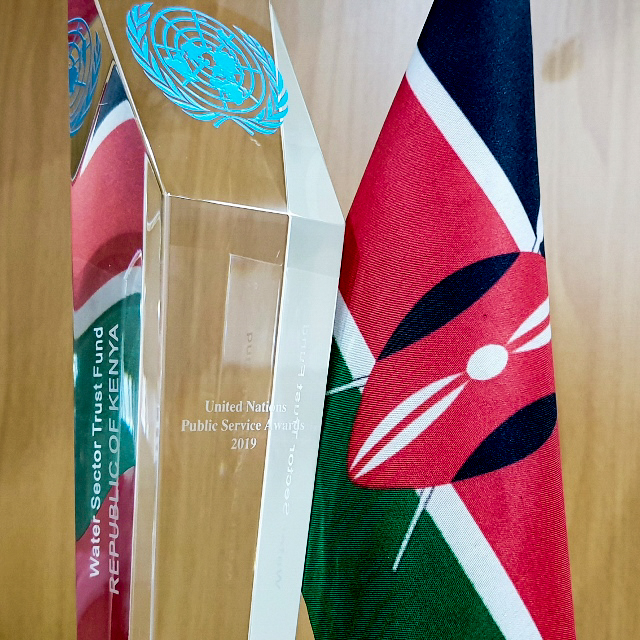
UNPSA Trophy
Water Sector Trust Fund (WaterFund) is a recipient of the prestigious 2019 United Nations Public Service Awards (UNPSA), after its Up-scaling Basic Sanitation for the Urban Poor (UBSUP) programme was selected as one of the winners of the award under the “Delivering Inclusive and Equitable Services to Leave No one Behind” category.
Hon. Simon Chelugui, Cabinet Secretary in the Ministry of Water and Sanitation, led the Kenyan delegation to receive the award in the city of Baku, Republic of Azerbaijan, from the 24th to 26th June 2019.
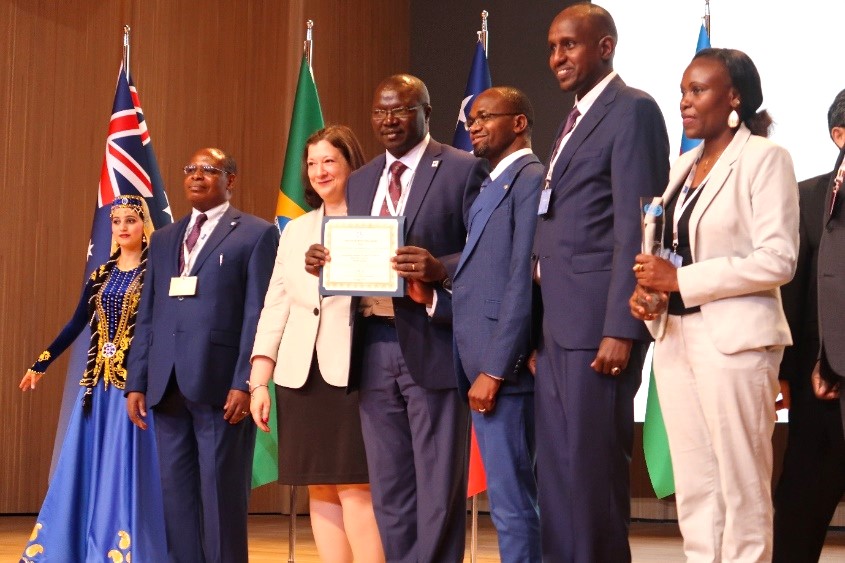
(From left to right) Mr. John Kauzya (Chief of Public Services Innovation Branch), Ms. Alia El-Yassir (Regional Director for Europe and Central Asia, UN-Women), Mr. Simon Chelugui (Cabinet Secretary, Ministry of Water and Sanitation) , Mr. Patrick Kokonya, (Chairman, WaterFund), Mr. Ismail Shaiye (Chief Executive Officer, WaterFund) and Ms. Stella Warue (Programme Officer, WaterFund)
The United Nations Department of Economic and Social Affairs (UNDESA) received 523 nominations from 72 countries but only 11 institutions won the 2019 Awards. WaterFund is the only institution from an African country to win at the Awards this year.
Previous UNPSA winners from Kenya are Agricultural Sector Development Support Programme in the year 2018 and Huduma Kenya Programme under the Ministry of Public Service, Youth and Gender Affairs in the year 2015.
United Nations Public Service Awards
The United Nations Public Service Awards (UNPSA) promotes and rewards innovation and excellence in public services in support of the realisation of the Sustainable Development Goals and the principle of ‘leave no one behind’.
The awards are organised by the United Nations Department of Economic and Social Affairs (UNDESA). UNPSA is an annual competition that takes place on 23rd June, as the United Nations Assembly designated Day to celebrate the value and virtue of public service to the community.
Every year UNDESA makes calls for proposals requesting for submissions of projects that promote and support innovation and excellence in the public service. The 2019 UNPSA were awarded to public institutions that distinguished themselves in any of the below categories:
- Delivering inclusive and equitable services to leave no one behind
- Ensuring integrated approaches in the public-sector institutions
- Developing effective and accountable public institutions
- Promoting digital transformation in public sector institutions
- Promoting gender responsive public services to achieve the SDGs
The winners are designated according to the UN Regional Groups, that is, Africa, Asia and the Pacific, Eastern Europe, Latin America and the Caribbean, and Western Europe.
Integrated Approach to Solving Sanitation Challenges in Kenya
According to the Kenyan Constitution of 2010, every Kenyan has a right of access to basic sanitation. Kenya is also a signatory to the Sustainable Development Goals (SDGs) which requires everyone to have access to sanitation by the year 2030. It is important to note that the current sewerage coverage in Kenya is 16%, and the Ministry of Water and Sanitation is employing great effort towards ensuring the coverage has increased. In order to reach the goal of access to sanitation for all by 2030, an integrated approach to solving sanitation challenges is needed.
The Up-scaling Basic Sanitation for the Urban Poor (UBSUP) programme offers an affordable solution for accelerating the achievement of SDG 6.2 (achieve access to adequate and equitable sanitation and hygiene for all), upon which the programme won the award.
UBSUP’s unique features that led to the winning of the award include: its great impact on sanitation services offered in an inclusive and equitable manner without leaving anyone behind; the nation-wide approach of the programme; cost efficiency; and the pro-poor component of offering a post-construction incentive for the projects.
UBSUP is financed by the German Development Bank (KfW), The Gates Foundation and the Government of Kenya at a total cost of KSh 1.46 Billion, with technical support from GIZ. The programme targets a beneficiary base of 400,000 people with improved sanitation services as well as 200,000 with access to clean and safe drinking water. The programme started in 2011 and will end in December 2020. WaterFund works with the Water Services Providers (WSPs) all over the country.
The programme provides a post-construction incentive or subsidy for the toilets at a cost of KSh 20,000 for a new toilet and KSh 15,000 for a rehabilitated toilet. The subsidy can only be paid after the landlords and house owners have completed the toilets which meet the specified given standards.
The WSP should also prove that they are able to cover the full sanitation value chain where the faecal waste is contained, emptied and transported to a treatment facility and thereafter the treated waste can be reused for productive purposes. In the sanitation value chain, WaterFund only provides the funds for the containment and for the treatment of the waste. Decentralised Treatment Facilities are funded as a full grant to be able to treat the waste generated.
Currently about 250,000 people have been reached out of the 400,000 people targeted for the programme. The target is expected to be met and exceeded with the implementation of the 2nd call for proposals. There are 18 DTFs being implemented currently and 15 more are expected to be funded in the next call for proposals.
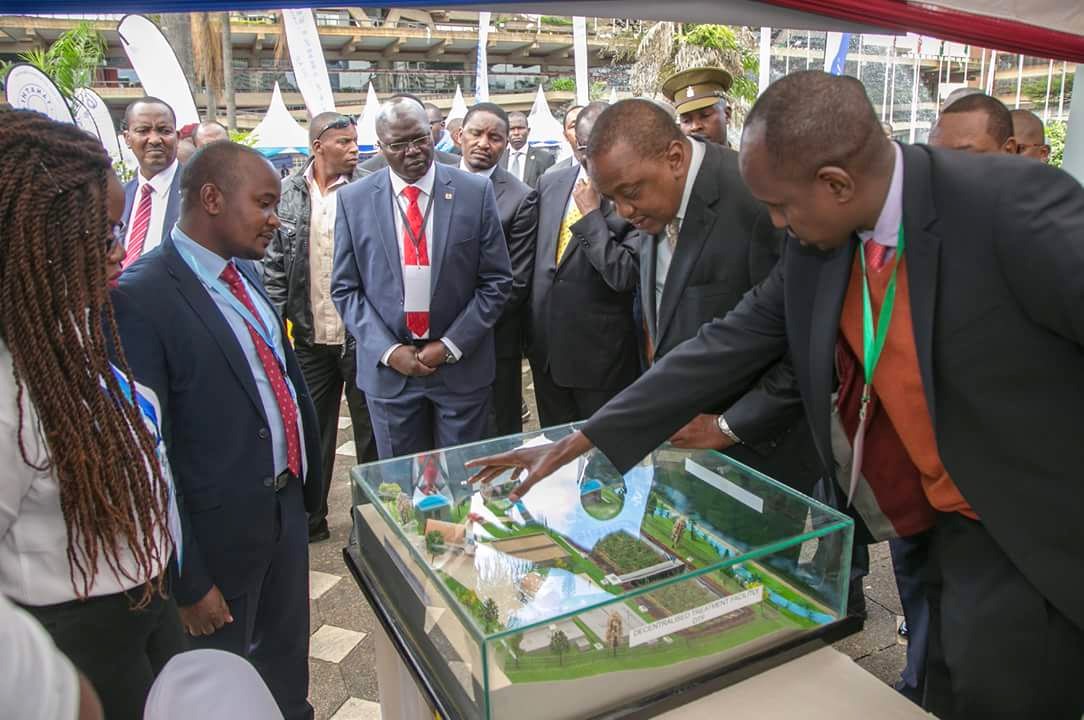
Mr. Ismail Shaiye, Chief Executive Officer, WaterFund (right), uses a model to explain the Decentralised Treatment Facility concept to H.E. Uhuru Kenyatta, President of the Republic of Kenya (second from right), in May 2018 at KICC, Nairobi, during the launch of Ministry of Water and Sanitation’s Rapid Results Initiative (RRI)
Opportunities for Scaling Up the Sanitation Programme
The UBSUP programme has been implemented in 19 counties and the need is still evident; however, the current financing runs until the year 2020. WaterFund being a public national entity has a mandate to reach all 47 counties. There has been a lot of interest from different counties; however, financing is not adequate to meet the demand.
Given the merits of the programme, the Ministry of Water and Sanitation through WaterFund would like to scale up the implementation of the programme. This is in a bid to achieve access to sanitation for all by the year 2030 and also complement the Big 4 Agenda of the Government.
WaterFund proposes that the UBSUP concept be adopted as a government policy that would eventually facilitate wide-scale implementation of the DTFs in areas without conventional sewerage system.
The DTFs offer comparative advantage in the following ways:
- The DTF is more affordable in comparison to the capital costs required for the sewer network and treatment
- Low maintenance cost (no or less electricity consumption)
- Requires a relatively small piece of land ranging from ¼ to ½ an acre
- Responsive to the needs of the clients in terms of design capacities
- High potential of local reuse of water, nutrients and energy depending on the DTF model
- Offers an alternative where conventional sewer is not applicable
- Shorter implementation period compared to the conventional sewer treatment facilities
During the Ministry of Water and Sanitation’s Rapid Results Initiative launch held on May 2018 at KICC, H.E The President gained interest in the DTF Concept. Consequently WaterFund submitted a concept to the Office of the President on “Urban and peri-urban water and sanitation programme” requesting for KSh 7.182 Billion for sanitation intervention that includes a water component for the hygiene purposes.
Award in Pictures
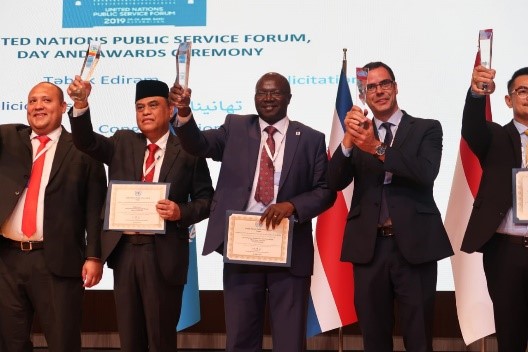
Hon. Simon Chelugui, CS, Ministry of Water and Sanitation, joins other winners on stage
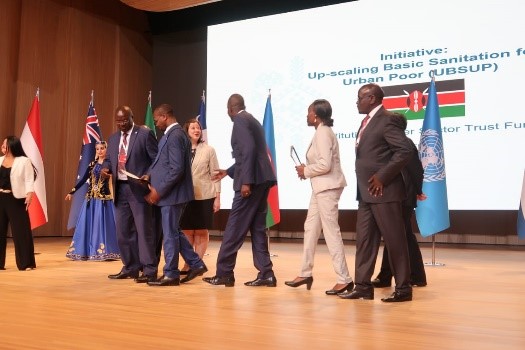
WaterFund team receives the award
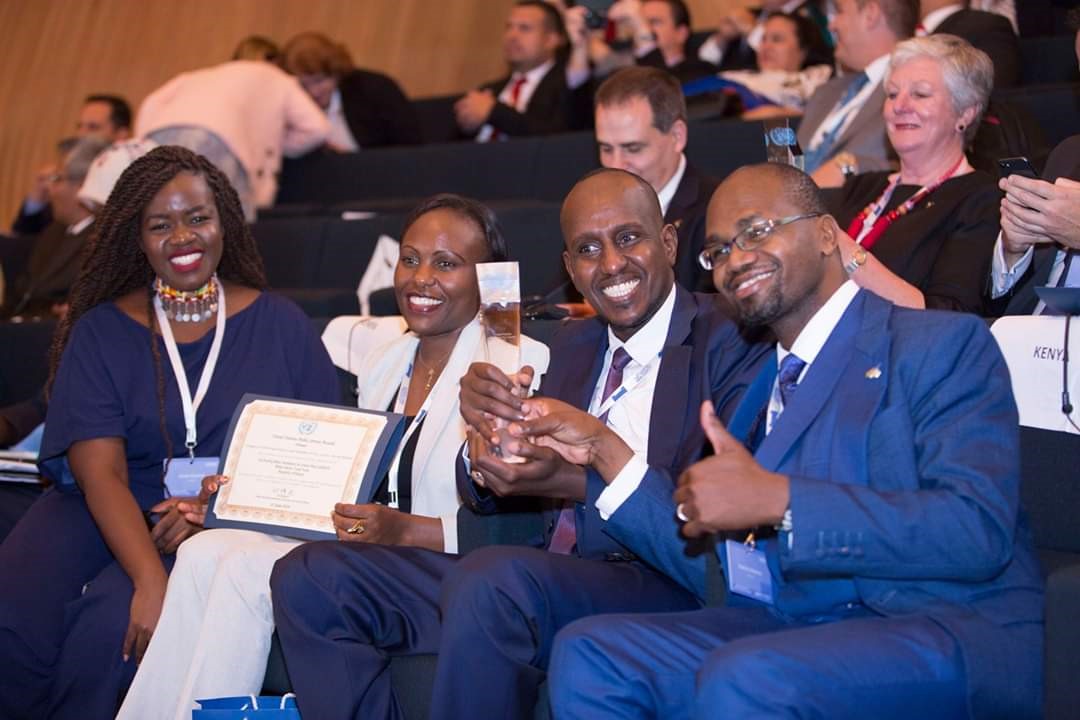
WaterFund team is all smiles with the winner’s trophy and certificate
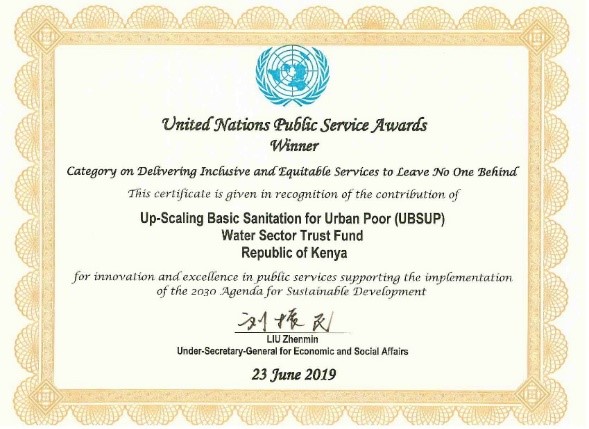
The UNPSA Winner's Certificate
